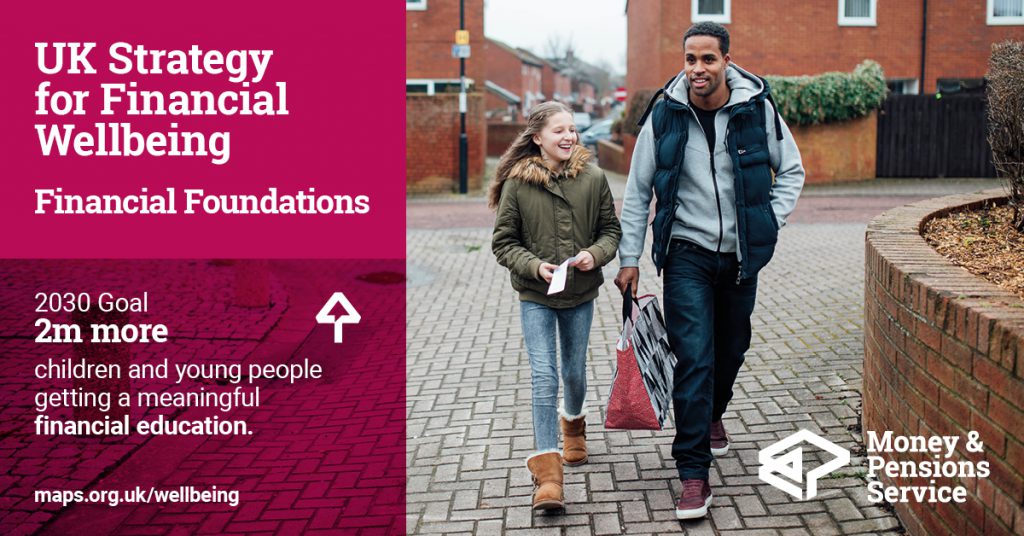Four things Covid-19 highlighted about financial education

This Global Money Week, children and young people policy manager Zoe Renton shares four things the Covid-19 pandemic and recovery highlight about delivering meaningful financial education.
There is a real opportunity to ensure that families are supported to build their children’s money skills, young people get targeted money guidance, financial education programmes are tailored to meet the needs of children and young people in vulnerable circumstances, and teachers have the skills, confidence and tools to develop the money skills of their learners.
The impact of Covid-19 on young people’s education and employment opportunities has highlighted, more than ever, the importance of them developing good money knowledge, skills and attitudes – which are key foundations for financial wellbeing now and in later life.
As we begin to overcome the global pandemic, it seems apt that organisations from across the world will be coming together to celebrate Global Money Week, raising awareness of the importance of good quality financial education for all children and young people.
We know that, in the UK, fewer than half of seven to 17 year olds are getting the financial education they need at home or in school.

That’s why the UK Strategy for Financial Wellbeing sets an ambitious target to see two million more children and young people receiving a meaningful financial education by 2030.
As the Money and Pensions Service (MaPS) continues to work with partners to achieve this goal, here are four things the pandemic has taught us about building strong financial foundations for the next generation.
1. Having positive conversations about money at home is vital
Research shows that parents talking to and teaching their children about money has a hugely positive effect, even in the early years. We know that the Covid-19 pandemic has affected many families’ finances, and parents and carers may be feeling more anxious about discussing money matters at home.
We have a range of helpful tips and activities to help parents kickstart these conversations and build them into everyday activities with their children. We are also scaling up our flagship Talk, Learn, Do programme in Northern Ireland, Scotland and Wales, equipping parents with the tools and knowledge to build the financial capability of their children, and testing new ways to build financial foundations in the early years.
2. Young people need quality financial education and guidance as they go through life transitions
As our economy recovers from the effects of Covid, young people will be moving onto tertiary education or employment in particularly uncertain circumstances. Ensuring this age group develops and practices good money habits will be an important focus for the financial education sector, particularly as we know that interventions delivered at life transitions can be particularly effective in improving young people’s money knowledge, skills and habits.
MaPS continues to test new approaches to delivering and scaling provision for young people and young adults, including support for 16-17 year olds at school and college and multichannel money and pensions guidance for young adults as they become financially independent with incomes of their own.
We are supporting innovation too, sponsoring a prize to support the financial resilience of 16-24-year-olds trying to make their way in the labour market, as part of NESTA’s £3 million Rapid Recovery Challenge fund.
3. We need tailored programmes to meet the needs of young people in vulnerable circumstances
Evidence shows that young people in vulnerable circumstances, such as those with a long-term illness, are less likely than their peers to have the money skills and knowledge they need. Others, such as care-experienced young people, may require extra targeted support. However, at present, there is a limited understanding of what works to achieve good outcomes for these young people, and there are few tailored programmes focused on meeting their needs.
Our £900,000 financial education innovation programme is seeking to fill that gap by taking a test and learn approach to improve the money skills of children and young people in vulnerable circumstances, with results due in autumn this year. This includes trialling innovative digital approaches, such as a platform that connects young people with opportunities to earn money while they acquire new financial skills.
4. Schools will need support to deliver quality financial education as they drive educational recovery
As the focus of school leaders and teachers shifts to educational recovery for their students, financial wellbeing can play an important role. MaPS funds the development of resources and tools to help teachers deliver excellent learning about money in the classroom.
For example, with Martin Lewis, founder of Money Saving Expert, we are supporting a programme of work to ensure Young Money’s Your Money Matters – the only financial education textbook for secondary schools – reaches more teachers and learners across the UK. At the same time, the Financial Education Quality Mark continues to ensure teachers have access to resources that have been tested for their effectiveness and financial accuracy.
Our professional learning pathfinder in Wales will develop our knowledge of how to scale teacher training in the long term, so practitioners can make the most of the resources and services available to them.
Ensuring young people are confident dealing with money matters will be vital, as the UK and the globe recovers from the pandemic. Our UK Strategy for Financial Wellbeing includes delivery plans, which are due to be published later this year. These will set out the actions we and our partners will take across the UK to increase and improve financial education for all children and young people. We look forward to working with our partners at home and abroad to achieve that vision.
Get in touch
For more information about Global Money Week, visit globalmoneyweek.org.
Want to find out more about our work to improve financial education? Go to our page for schools, or email us at cyp@maps.org.uk.
